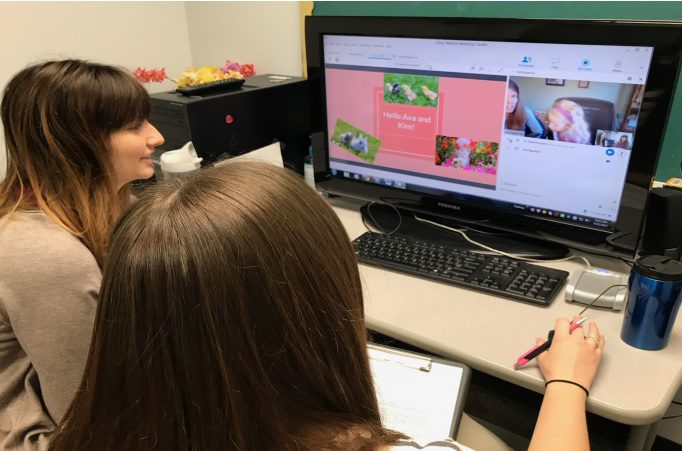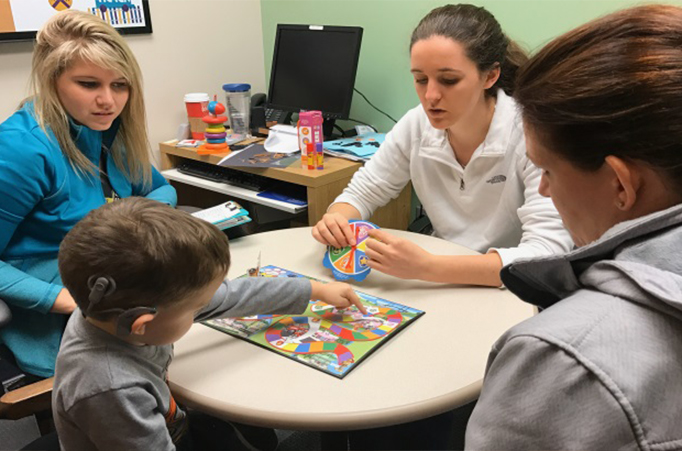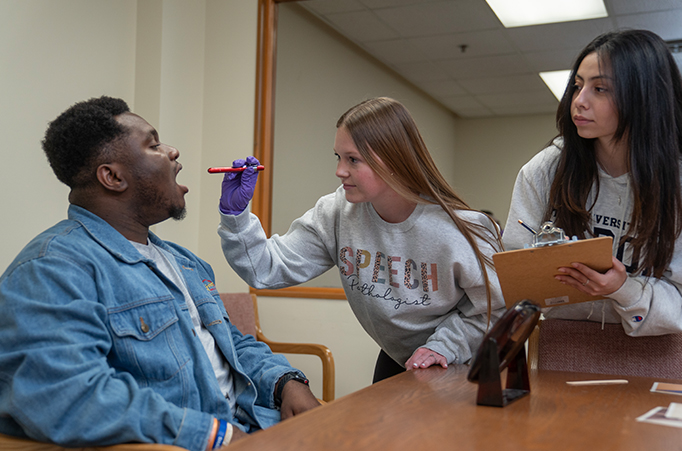Specialization Training Programs and Certificates
Interprofessional-Hearing Early Access Response through Telepractice (I-HEART)
Interested students entering the traditional on-campus graduate program in Speech-Language Pathology, students beginning their second year of studies in the NOAC Audiology program, and students beginning their third semester in the Collaborative, Distance-Learning Speech Language Pathology graduate degree programs at The University of Akron, will collectively have the opportunity to apply to participate in the Interprofessional-Hearing Early Access Response through Telepractice (I-HEART) specialization program.
Dr. K. Todd Houston (SLP) and Dr. Alex Meibos (AuD) in our school were awarded a five year grant (from 2021 through 2026) from the Office of Special Education and Rehabilitative Services at the U.S. Department of Education to train graduate students in both Speech-Language Pathology and Audiology programs at UA, in evidence-based practices to prepare them to work interprofessionally in serving young children with hearing loss and their families through in-person, telepractice, and hybrid service delivery models.
Students will enroll in a 5 semester, 12 credit certificate program, including two advanced online courses devoted to facilitating services for optimizing listening and spoken language outcomes for children with hearing loss, learning related concepts and technologies, participate in focused on and off-campus practica, and take part in a range of field-based and tele-health observations and clinical experiences (e.g., case management, device procurement, mentoring, and more). Students will develop advanced knowledge and skills in the areas of early hearing detection and intervention (EHDI), cochlear implants, modern hearing aids, telepractice, and special therapeutic techniques (e.g., Auditory-Verbal Therapy). While enrolled in each respective professional degree program, students complete all requirements for licensure and certification as a speech-language pathologist (SLP) or audiologist (AUD) through the Ohio Board of Speech-Language Pathology and Audiology (OBSLPA) and American Speech-Language Hearing Association (ASHA).
Upon completion of each program's requirements, students will earn a school certificate of competencies in the specialization area.Interested students who are selected for the specialty program may be eligible for some financial assistance through external funding sources.
Required Courses and Practica:
- SLPA: 660 Introduction to Telepractice Service Delivery (3 credits)
- SLPA: 667 Facilitating Auditory Learning & Spoken Language via Telepractice (3 credits)
- SLPA: 665 Additional Interprofessional practica and activities (totaling up to 6 credits)
Each year, a limited number of students will be enrolled in the certificate program. Applications for admission to the program are accepted only once per year. Admission is competitive and decisions are made prior to graduate school admission for incoming SLP on-campus students, and prior to the start of the second year of study for NOAC audiology and SLP online students. If you wish to learn more about the program, contact the I-HEART Coordinator, Dr. K. Todd Houston (houston@uakron.edu).
History of Graduate Listening and Spoken Language Pediatric Training at UA
The University held funding from the U.S. Department of Education for early intervention training in preparing 32 SLP graduate students from 2007-2011, and 48 SLP students from 2012-2018, to work with children with hearing loss as they learned to maximize the use of technology such as hearing aids and cochlear implants. The grant trained 8 graduate SLP students per year for the duration of their entire graduate program. The trainees also received funding support. Former personnel preparation grants were joint ventures with Kent State University (2007-2011) and the University of Toledo (2012-2018). Specialized coursework enriched the trainees’ knowledge and background related to the special training needs of infants, toddlers and children with hearing loss, and the new I-HEART program is designed to build upon these previous successful award programs with greater emphasis on telepractice and interprofessional collaborative service delivery.
Augmentative-Alternative Communication (AAC) Certificate
Approximately 4 million Americans are not able to use natural speech to meet their communication needs. According to the American Speech Language Hearing Association (ASHA), augmentative-alternative communication (AAC) is defined as the area of clinical practice that attempts to compensate for the impairment or disability patterns of individuals with severe communication disorders. When using AAC, individuals with complex communication needs (CCN) access high and low technology strategies to compensate for their spoken and written impairments. While individuals with CCNs benefit from AAC, many do not receive adequate technical support, intervention, advocacy, and training around AAC. That lack of AAC support is directly related to the latest employment statistics, which indicate a shortage of well-trained SLPs who focus in AAC. In addition, 42% of Ohio school administrators want to hire SLPs with expertise in AAC.
To address the increasing need for SLPs with AAC expertise, The University of Akron School of Speech-Language Pathology and Audiology developed the Augmentative-Alternative Communication (AAC) Certificate. The University of Akron is one, if not the only, speech-language pathology master's programs in the nation to offer a formal certificate. Through this certificate program, graduates will receive a Master’s of Arts Degree (M.A.) in Speech-Language Pathology as well as a certificate of training in AAC. The AAC Certificate program is run concurrently with the existing 5 semester graduate program, and funding may be available through AAC focused internships and the AAC fellowship position.
The Augmentative and Alternative Communication (AAC) Certificate offers advanced knowledge and specialized clinical training in AAC, including assessment and evaluation procedures, intervention planning and strategies, implementation of technology, parent and caregiver training, and professional development experiences. Certificates are awarded to eligible graduate students who complete a sequence of focused and advanced coursework, internship requirements, and clinical experiences, all within the area of AAC.
Required Courses and Practica:
- SLPA:540 Augmentation Communication (3 credits)
- SLPA:608 Advanced Skills in Augmentative-Alternative Communication (1 credit)
- SLPA:613 Advanced Topics in Augmentative-Alternative Communication (3 credits)
- SLPA:693 School-based Externship: Speech Language Pathology (6 credits)
Each year, a limited number of students are enrolled in the certificate program. Applications for admission to the program are accepted only once per year. Admission is competitive and decisions are made prior to graduate school admission. If you wish to learn more about the Augmentative-Alternative Communication (AAC) Certificate Program, contact the AAC Certificate Coordinator, Mrs. Morgan Besozzi at mbesozzi@uakron.edu
Specialization in Neurogenic Disorders of Communication and Swallowing
A national survey showed 22% of new SLP graduates accepted positions in health care settings (ASHA, 2021). ASHA membership data showed 38% of all SLPs in the US worked in medical settings. Closer to home, surveys of our University of Akron graduates showed some wished they could have obtained additional clinical training and specialized coursework related to serving clients with neurogenic communication and swallowing disorders. In order to ensure our graduates felt as prepared as possible after graduation to work in medical settings, Dr. Charles Carlin created this specialization.
Interested students entering the traditional on-campus graduate program in speech-language pathology at The University of Akron will have the opportunity to apply to participate in the Neurogenic Disorders of Communication and Swallowing Specialization.
Students will enroll in a 5 semester, 11 credit hour specialization that is devoted to developing their advanced knowledge and skills with working with clients with brain injuries, dementia, dysphagia, and degenerative diseases. Additionally, students will participate in focused on and off-campus practica and take part in a 3-5 semester internship.
Upon completion of the program's requirements, students will earn a school certificate of completion in the specialization area. They will also complete all requirements for licensure and ASHA certification as a speech-language pathologist (SLP). Applicants who are selected for the specialty program may be eligible for some financial assistance through external funding sources.
Required Courses -
- SLPA: 625: Motor Speech Disorders (2 credits)
- SLPA: 634 Advanced Topics in Swallowing Assessment (1 credit)
- SLPA: 635 Advanced Topics in Swallowing Intervention (1 credit)
- SLPA: 695 Externship: Speech-Language Pathology (6 credits)
Each year, a limited number of students will be enrolled in the certificate program. Applications for admission to the program are accepted only once per year. Admission is competitive and decisions are made prior to graduate school admission for incoming SLP on-campus students. If you wish to learn more about the program, then contact Ms. Denise Simcox at dsimcox@uakron.edu.



